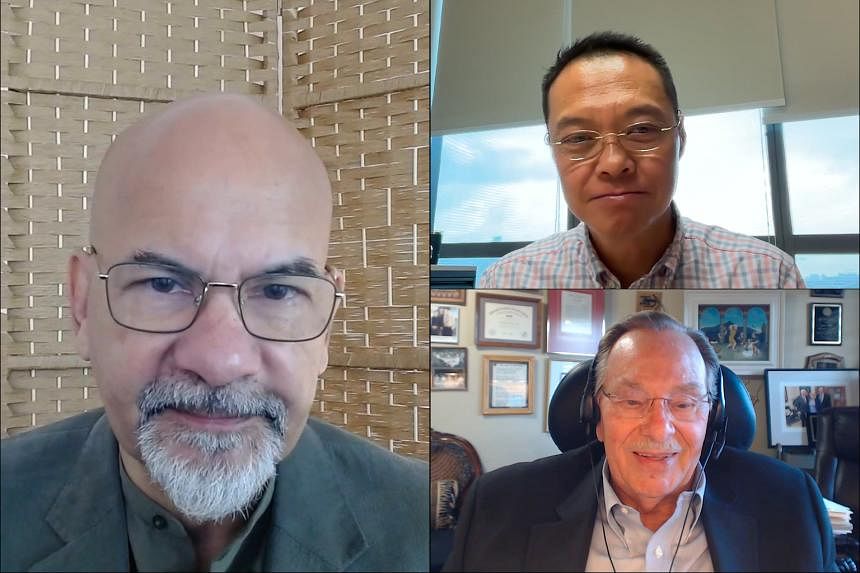It is widely assumed that dengue will expand in a warming planet as the Aedes mosquito’s range spreads into new conducive habitats, with predictions that dengue will impact 60 per cent of the world’s population by 2080 - up from about half of the population currently at risk.
But dengue can be controlled regardless, emphasises dengue guru Professor Duane Gubler, who sees the climate change factor as a copout, and argues that some of the funding that climate change draws, should be set aside for research on tropical diseases instead.
Emeritus Prof Gubler, who is also founding director of the Emerging Infectious Diseases (EID) Research Programme at Duke NUS Medical School, identifies himself as having maverick views on climate and dengue.
When I raised the question in ST’s latest Asian Insider podcast, he replied: “Yes, climate is important. We can’t have the transmission of these viruses unless the temperature and the humidity and other environmental factors play a role.”
“But it’s not a major driver of the epidemics.”
Europe and North America once experienced major epidemics of dengue, yellow fever, and malaria through the 1700s, 1800s and 1900s up to about 1935, he noted.
“We controlled it,” he said. “And we haven’t had a major epidemic of any of these diseases for over 80 years. Yet we still have mosquitoes. They’ve never eliminated the mosquitoes.”
“They occur in the Gulf Coast states. And we do have sporadic transmission now and then, mainly from introduced viruses. But we didn’t control it by reducing the temperature or by controlling the mosquitoes.”
“That contributed of course, but we controlled these diseases by increasing the living standards of the population,” he said. “Better housing, better water systems, better sewage and waste management systems, better water drainage, urban renewal - if you will, building cities that are not conducive to mosquito breeding.”
Singapore is an example of this, with fewer dengue cases and fewer deaths or severe disease compared to other countries in the region.
The focus on climate change detracts from practical public health measures, Prof Gubler contended.
Another guest on the Green Pulse episode alongside Prof Gubler was Professor Ooi Eng Eong. He is also at the EID programme in the same institution and a joint professor at NUS’ Saw Swee Hock School of Public Health.
Prof Ooi emphasised the need to consider minimising the mosquito population when building future cities.
While a warmer planet will affect the distribution of mosquitoes and the length of time they can thrive, it will also change human behaviour, he said.
When warmer temperatures put stress on the agriculture sector, for instance, more people may move to cities, which is exactly where the Aedes mosquito and the dengue virus thrive, with the virus circulating back and forth from mosquitoes to people.
“We have to watch that; there’s going to be more migration to cities,” he said. “A lot of the cities that will be built in the second half of this century... have not (yet) been built today.”
“Don’t just build a city and then try and control mosquitoes...as you build the cities, why don’t we think about building out the mosquitoes,” he added.
Prof Ooi also advocated the use of dengue vaccines.
He said: “Essentially, all the dengue vaccines are imperfect.. that goes for every other tool that we have to prevent dengue; they are not perfect.
“So I think the issue for us is... how do we use each of these imperfect tools in such a way that when we use them in an integrated fashion, the benefits cancel out the risks or minimise the risks.”
Focusing on the risks alone, while ignoring the benefit, is in itself wrong, Prof Ooi emphasised.
---
Produced by: Nirmal Ghosh (nirmal@sph.com.sg) and Fa’izah Sani
Edited by: Fa’izah Sani
Follow Asian Insider with Nirmal Ghosh every fourth Friday of the month here:
Channel: https://str.sg/JWa7
Apple Podcasts: https://str.sg/JWa8
Spotify: https://str.sg/JWaX
Website: http://str.sg/stpodcasts
Feedback to: podcast@sph.com.sg
Follow Nirmal Ghosh on X: https://str.sg/JD7r
Read Nirmal Ghosh’s articles: https://str.sg/JbxG
Register for Asian Insider newsletter: https://str.sg/stnewsletters
---
Discover more ST podcast channels:
All-in-one ST Podcasts channel: https://str.sg/wvz7
The Usual Place: https://str.sg/wEr7u
In Your Opinion: https://str.sg/w7Qt
COE Watch: https://str.sg/iTtE
Asian Insider: https://str.sg/JWa7
Health Check: https://str.sg/JWaN
Green Pulse: https://str.sg/JWaf
Your Money & Career: https://str.sg/wB2m
Hard Tackle: https://str.sg/JWRE
#PopVultures: https://str.sg/JWad
Music Lab: https://str.sg/w9TX
---
ST Podcast website: http://str.sg/stpodcasts
ST Podcasts YouTube: https://str.sg/4Vwsa
---
Special edition series:
True Crimes Of Asia (6 eps): https://str.sg/i44T
The Unsolved Mysteries of South-east Asia (5 eps): https://str.sg/wuZ2
Invisible Asia (9 eps): https://str.sg/wuZn
Stop Scams (10 eps): https://str.sg/wuZB
Singapore’s War On Covid (5 eps): https://str.sg/wuJa
---
Get The Straits Times’ app, which has a dedicated podcast player section:
The App Store: https://str.sg/icyB
Google Play: https://str.sg/icyX


